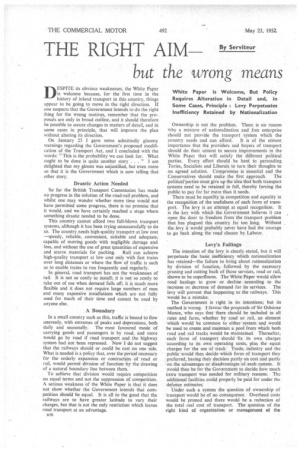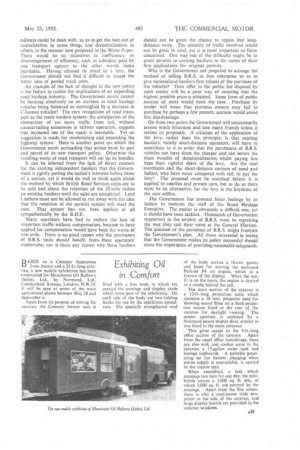THE RIGHT AIM
Page 50

Page 53

If you've noticed an error in this article please click here to report it so we can fix it.
but the wrong means DESPITE its obvious weaknesses, the White Paper is welcome because, for the first time in the history of inland transport in this country, things appear to be going to move in the right direction. If one suspects that the Governmenfintends to do the right thing for the wrong motives, remember thatthe proposals are only in broad outline, and it should therefore be possible to secure changes in matters of detail, and in some cases in principle, that will improve the plan without altering its direction.
On January 25 I gave some admittedly gloomy warnings regarding the Government's proposed modification of the Transport Act, and I concluded with the words: "This is the probability we can look for. What ought to be done is quite another story . . . " I am delighted that my gloom was unjustified, but -even more so that it is the Government which is now telling that
other story. ,
Drastic Action Needed
So far the British Transport Commission has made no progress in the solution of the road-rail problem, and whilst one may wonder whether more time would not have permitted some progress, there is no promise that it would, and we have certainly reached a stage where something drastic needed to be done.
This country cannot afford two full-blown transport systems, although it has been trying unsuccessfnlly to do so. The country needs high-quality transprirt at low cost —speedy, reliable, convenient, suitable and adequate, capable of moving goods with negligible damage and lass, and without the use of great quantities of expensive and scarce materials for packing. Rail can achieve high-quality transport at low cost only with fast trains over long distances or where the flow of traffic is such as to enable trains to run frequently and regularly.
In general, road transport has not the weaknesses of rail. It is not so costly to install; it is not so costly to take out of use when demand falls off; it is much more flexible and it does not require large numbers of men and many expensive installations which are not fully used for much of their time and cannot be used by anyone else.
A Boundary
In a small country such as this, traffic is bound to flow unevenly, with extremes of peaks and depressions, both daily and seasonally. The most favoured mode of carrying goods and passengers is by road, and more would go by road if road transport and the highway system had not been repressed. Now I do not suggest that the railways should or could be cast on one side. What is needed is a policy that, over the period necessary for theorderly expansion or -contraction of road or rail, Would permit division of function by the drawing of a natural boundary line between them.
To achieve that division would require competition On equal terms and not the suppression of competition. A serious weakness of the White Paper is that it does not show whether the Government . intends that competition should be equal. It is all to the good that the railways are to have greater .latitude to vary their charges, but that is not the only restriction which leaves road transport at an advantage.
B16 Ownership is not the problem. There is no reason why a mixture of nationalization and free enterprise should not provide the transport system which the country needs and can afford. It is of the utmost importance that the providers and buyers of transport should do their utmost to secure improvements in the White Paper that will satisfy the different political parties. Every effort should be bent to persuading Tories, Socialists and Liberals to turn their thoughts to an •agreed solution. Compromise is essential and the Conservatives should make the first approach. The politicaPparties must give up the idea that both transport systems need to be retained in full, thereby forcing the public to pay for far more than it needs.
There must be equality in competition and equality in the recognition of the usefulness of each form of transport. The levy is an attempt at equal recognition. It is the key with which the Government believes it can open the door to freedom from the transport problem that has plagued this country far too long. Without the levy it would probably never have had the courage to go back along the road chosen by Labour.
Levy's Failings
The intention of the levy is clearly stated, but it will perpetuate the basic inefficiency which nationalization has retained—the failure to bring about rationalization by division of function, followed by the necessary pruning and cutting back of those services, road or rail, shown to be superfluous. The White Paper would allow • road haulage to grow or decline according to the
• increase or, decrease of demand for its services. The levy will prevent that happening to the railways. This would be a mistake.
The Government is right in its intentions; but its method is wrong. Ifavour the proposals of Sir Osborne Mance, who says that there should be inckided in all
• rates and fares, whether by road or rail, an element which would be common to either system and would be used to create and maintain a pool from which both road and rail tracks would be maintained. Thereafter, each form of transport should 'fix its own charges according to its own operating costs, plus the equal charges for the use of track Trade, industry and the public would then decide which form of transport they preferred, basing their decision partly on cost and partly on the advantages Or disadvantages of each system. It would then be for the Government to decide how much extra transport was needed for military reasons. The additional facilities could properly be paid for under the defence estimates.
Under such a system the question of ownership of transport would be of no consequence. Overhead costs would be pruned and there would be a reduction of the total real cost of transport. The question of the right kind of organization or management of the
railways could be dealt with, so as to get the best out of centralization in some things and decentralization in others, in the manner now proposed in the White Paper.
• There would be no incentives to inefficiency, or discouragement of efficiency, such as subsidies paid by one transport agency to the other would make inevitable. Having attuned its mind to a levy, the Government should not find it difficult to accept the better idea of pooled track costs.
An example of the lack of thought in the new policy is the failure to realize the implications of an expanding road haulage industry. The Government surely cannot be banking absolutely on an increase in road haulage vehicles being balanced or outweighed by a decrease in C-licence vehicles? The very recognition of road transport as the more modern system; the anticipation of the abstraction of yet more traffic from rail, without countervailing economies in railway operation, suggests that increased use of the roads is inevitable. Yet no suggestion is made for modernizing and expanding the highway system. Here is another point on which the Government needs persuading that action must be part and parcel of its new transport policy. Otherwise the resulting waste of road transport will eat up its benefits.
It can be inferred from the lack of direct concern for, the existing independent hauliers that the Government is rightly putting the nation's interests before those of a section, yet it would do well to think again about the method by which British Road Services units are to be sold and about the retention of the 25-mile radius on existing hauliers until the sales are completed. Lord Leathers must not be allowed to run away with the idea that the retention of the permits System will meet the case. That system has not been applied at all sympathetically by the R.H.E.
Many operators have had to endure the loss of important traffic without compensation, because to have applied for compensation would have been the worse of two evils. There is no good reason why the purchasers of B.R.S. units should benefit from these operators' misfortune; nor is there any reason why these hauliers should not be given the chance to regain that longdistance work. The quantity of traffic involved would not be great in total, yet it is most, important to those concerned. One way out of the difficulty might be to grant permits to existing hauliers in the terms of their first applications for original permits.
Why is the Government not prepared to arrange the method of selling B.R.S. to free enterprise so as to give nationalized hauliers first refusal of the purchase of the vehicles? Their offer to the public for disposal by• open tender will be a poor way of ensuring that the highest possible price is obtained. Some form of public auction of units would meet the case. Purchase by tender will mean that previous owners may fail to purchase by perhaps a few pounds; auction would avoid this disadvantage.
On these two points the Government will unnecessarily arouse much bitterness and lose many friends unless it revises its proposals. A criticism of the application Of the levy, rather than the principle, is that existing hauliers, mostly short-distance operators, will have to contribute to it in order that the purchasers of B.R.S. vehicles can have them the cheaper and can secure the main benefits of denationalization whilst paying less than their rightful share of the levy. Are the coal merchants and the short-distance carriers of sand and ballast, who have never competed with rail, to pay the levy? The proposal must be scotched before it is applied to coaches and private cars, but to do so there must be an alternative, for the levy is the keystone of the new edifice.
The Government has aroused bitter feelings by its failure to mention the staff of the Road Haulage Executive. The matter is obviously a difficult one, yet it should have been tackled. Thousands of Government supporters in the employ of B.R.S. must be regretting the way they cast their votes at the General Election. The question of the personnel of B.R.S. might frustrate the Government's plan. All those interested in seeing that the Government makes its policy successful should stress the importance of providing reasonable safeguards.




















































































